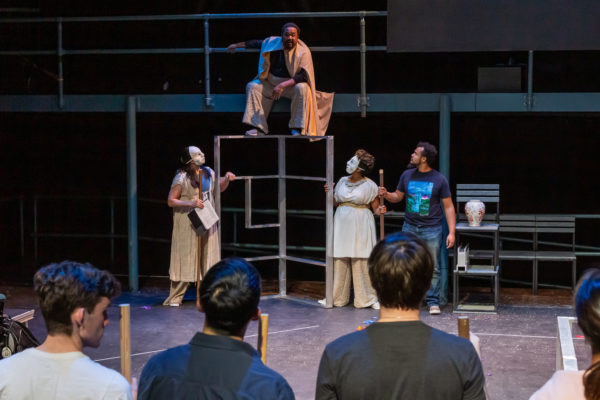“Don’t Go” Gives Students a Chance to Leave Their Mark With Experimental Theatre Workshop
On November 20, in a dimly lit Neely Auditorium, the Greek heroine Antigone stood center stage. She was in anguish and held a white balloon against her body. She popped the balloon, projecting red confetti into the air, and fell to the floor. Her fiancé, Haemon, entered the scene and did the same. In the stillness, her uncle, King Creon, entered the scene. With the help of six strangers, a table was pieced together around the bodies and the group sat down for a feast.
This stark scene wasn’t simply part of a modern retelling of a classic Greek tragedy, it was part of an experimental and innovative type of theatre gaining traction at Vanderbilt and beyond: theatre as social activism.

The retelling of Antigone is just one act of a much larger and deeper production called Don’t Go by the Sojourn Theatre, an award-winning ensemble company comprised of 17 artists from across the country. Four Sojourn actors, seven Vanderbilt theatre students, and a group of six volunteer strangers workshopped together over the past two weeks to shape a performance that moves audiences to action. The group hopes to use the piece to connect strangers and figure out how we can have difficult conversations in a polarized society.
Nik Zaleski, the director of production for Don’t Go, said the performance uses a three-act structure to investigate two central questions: how do we build relationships with strangers, and what does it take to stay in difficult conversations? The group at Vanderbilt worked to build Act 2, the part of the production that bonds a group of strangers to one another.
The performance, Zaleski said, is based on the hypothesis that “When people accomplish great things together—spectacular, wild things, like a retelling of the Antigone story—they are more likely to connect across difference. Act 1 helps people to meet each other. [Act 2] helps them deepen their connection. Act 3 asks them to stay with it, even when conversation challenges or confronts them.”
The concept resonated with faculty in the Theatre department and made them want to give students an opportunity to be part of the process. Leah Lowe, Chair of the Department of Theatre, said this type of involvement in experimental theatre provides students with a valuable perspective on what type of work they want to do and why they want to do it.

“It’s always good for students who are learning about a creative field to get experience with as many different artists as possible because I think that’s part of figuring out who you are artistically. You need a lot of exposure to a lot of different approaches,” Lowe said.
The decision to have strangers retell the story of Antigone was a long process, Zaleski said, but it centered on the idea of finding a story where the characters in conflict are both equally right and equally wrong. In many ways, the story of Antigone mirrors the divisiveness found in many of our modern issues. The lessons in Antigone are a perfect jumping-off point for the difficult discussions many of us face today. Taking that into consideration, this Sojourn production starts with the premise that there is not one point of view they are trying to amplify over another.
This foundation is an important part of what makes this Sojourn piece work. The Sojourn Theatre’s willingness to open the stage to a variety of ideas is a method Lowe thinks will help them reach their goals.
“I think they actually are very comfortable with the idea that an audience may have a lot of different kinds of things to say,” Lowe said. “And I think if you’re really going to do this work, you have to actually be open to listening to that—and they really are.”

Associate Professor of Theatre Phillip Franck, who has been helping to coordinate the production of Don’t Go, has been drawn to the way this piece and the Sojourn Theatre are thinking innovatively about where theatre fits into society.
“People are thinking about theatre in new ways, and social activism is one of the ways people are trying to explore what the form can do,” Franck said. “What can we do besides what we traditionally do, which is entertain and promote thinking about themes and ideas from plays about the human condition? How can we make theatre more actively a force for good?”
That question is one that Vanderbilt theatre students were ready to tackle. Those who worked as devising artists on this production had a lot of direct engagement in the piece and active participation in creating the work and helping it reach its goals. The ability to leave their mark on a piece is something Lowe said excites her about this production in particular.
“I think it’s so cool that they will be moving on from here and working on their third act somewhere else,” Lowe said, “but our students’ contributions to the piece will remain.”
